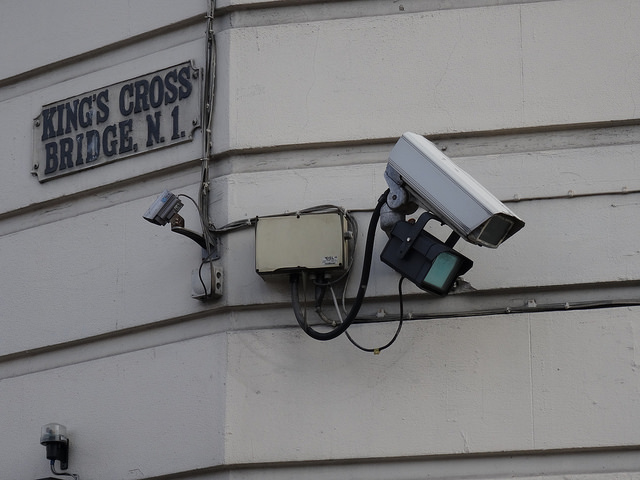While trying to photograph the 1,000+ CCTV cameras in London’s congestion zone this October, James Bridle found himself under citizen’s arrest. Bridle hopes to complete his project with a Flickr photo album and an animated heat map to raise awareness of surveillance and the role of the state in London. Speaking in-depth about the project, he theorizes the CCTV cameras represent the “third city wall” for London, which will precede successive walls that will track and monitor individuals in the minutest methods without consent.
- “I’m sitting naked inside an Yves Klein artwork; it’s a wooden box fitted with holes into which disembodied hands reach, touching my flesh”: Brian Boucher describes his experience as a nude model in Yves Klein’s never-before-exhibited Tactile Sculpture — an experiential work that Klein deemed too radical for an audience in the ’50s.
- “Architecture has always been a means to create hierarchies in space to produce and represent inequality, and to exercise control.” Architect and activist Eyal Weizman explains the intricate link between architecture and political powers. Using examples such as the effect of Israeli control on the physical space of Palestinians, Weizman claims that architecture offers another way to understand politics.
- There’s a plague in contemporary art/editorial photography, and Jörg Colberg dubs it “helicopterism”: “[T]he approach taken by so many photojournalists who fly in for a day or two, snap some dramatic pictures without any deeper engagement and are then off to the next spot.” While it’s unclear whether photography can change anything, Colberg touts the importance of the gesture of making an attempt to make change.
- Four decades after Lynda Benglis published a then-shockingly naughty ad in Artforum, she reflects on the work: “It was a study of the objectification of the self, myself in relation to the subject of the pinup. And when I did get it right I felt that image as one. The times were right, and it was a study for that time.”
- Sexism runs rampant in World of Warcraft, where the “façade of avatars” lets gamers freely perpetuate misogynistic gender stereotypes, writes Angela Washko, who founded the Council on Gender Sensitivity and Behavioral Awareness in WoW to discuss the issues.
- “A commune but with the Internet,” unMonastery is an open web platform and physical space that hosts tech idealists to brainstorm ideas for social change. One “unMonk” says the goal is to seek “an understanding of how a network can interact with [governmental] power.” Its most recent conference titled “Living on the Edge” discussed the communal management of resources when government structures break down.
Follow Art News From Elsewhere on the Walker Art Center homepage or via @walkermag, the Walker’s editorial-focused Twitter feed.




